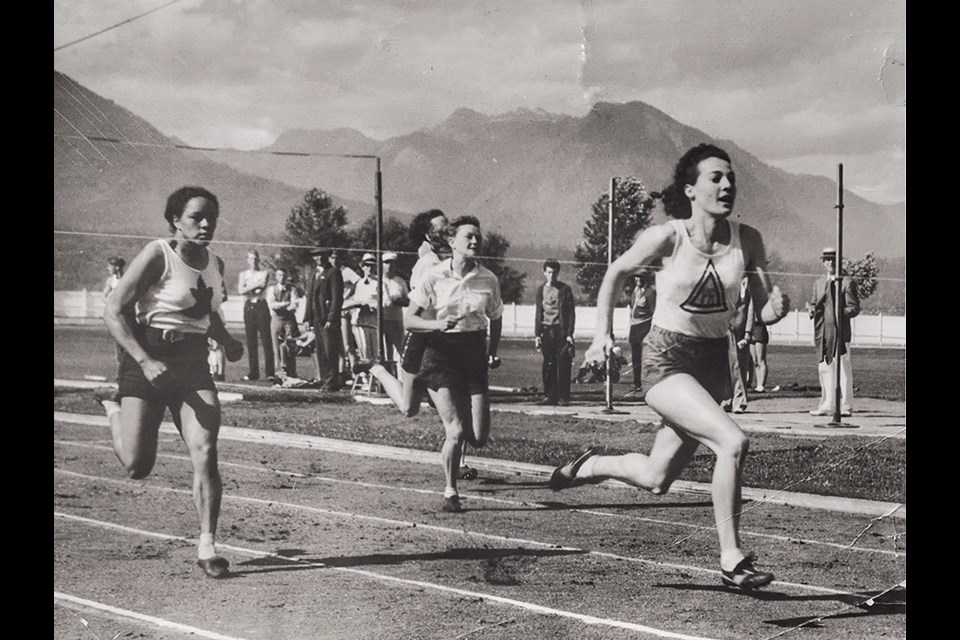Marion Borden, also known in the press as “Powell River’s Queen of the Cinders,” was a highly acclaimed and well-respected track athlete, and it all started in Powell River.
Borden will be inducted into the Powell River Sports Hall of Fame during a ceremony this June. She is one of nine individuals entering the hall during its second intake.
Born in Victoria, BC, on July 11, 1919, she was the third child of four born to Royal and Dorothy Borden. She spent her early childhood on Cortes Island where her parents homesteaded.
When it was time for her two older siblings to attend high school, the family moved to Powell River, where her father took a job at the Powell River Company’s pulp and paper mill.
Borden began competing in track events in high school at the age of 15. Powell River was a small town with a small track team. Martin Naylor, a senior member of the team, and a sprinting ace in his own right, trained and coached Borden.
By the time she turned 16, Borden was competing in large provincial track meets, Caledonian Games, Dominion Day CCF Sports Meet and Women’s BC Championships.
On July 1, 1937, just shy of her 17th birthday, she set a BC and Canadian record in the 75-yard dash at the CCF Track Meet in Nanaimo with a time of 8.6 seconds. Two years later she broke her own 75-yard record with a time of 8.5 seconds. This record still stands as the overall second fastest time in Canada.
Borden competed in track from 1936 through 1940. Newspaper headlines proclaimed her the “Powell River Flash” and “Powell River’s Cinder Cinderella” as she tore up the cinder paths around BC, setting records in the 60 metres, 100 metres, 75 yards and 100 yards. Howie McPhee, 1936 Olympian, said Borden had “the smoothest form he’d ever seen” and Women’s Athletic Federation representative Ann Clark stated she “was a bright prospect for Canada’s next Olympic team.”
Borden’s strongest competitor was Barbara Howard (BC Sports Hall of Fame inductee). Their perennial rivalry was great fodder for the press. They dubbed Marion “Queen of the Cinder Path” and “Paper Town’s Star Speedster” while Barbara was heralded as “Vancouver’s Favourite” and “the Grandview Rocket.”
The media hype brought great attention to women’s track and field. For three consecutive years Borden ruled the track at the CCF Sports Meet, taking home the prestigious 75- and 100-yard trophies.
Following high school, Borden had to juggle work and track training, often training in the early morning before heading off to work or hitting the track at dawn after coming off a night shift. She was quoted as saying “training often took place after work and before breakfast.”
On occasion she wasn’t able to travel ahead to out-of-town meets with her track team because she had to work a shift and would arrive at the track with only hours to spare before her events. It was difficult but she persevered.
The BC branch of the Women’s Amateur Athletic Federation named Borden the Outstanding Senior Woman Athlete in British Columbia for the 1938 season.
In 1939, as the lone entrant from BC, Borden travelled by train across Canada to Hamilton, Ontario, to compete nationally in the Women’s Canadian Championships. She made it through all of her heats to the finals in both the 60- and 100-metre sprints. She placed an impressive and respectable second in both races, bested only by 1936 Olympian Jeanette Dolson, and took silver home to BC.
Hamilton newspapers rated Borden as someone to “watch for in the upcoming 1940 Olympics” and the Toronto Daily Star said she was a sprinter with “class, style and promise” and “looms as the best BC prospect in years.”
Borden gave credit to the people of Powell River and the Powell River Company for supporting her track endeavours. Together they had raised the funds to send “Powell River’s Cinder Cinderella” to these national championships.
Next, Borden set her sights on the Olympics and the likelihood of her making the Canadian team was very high. However, with World War II raging throughout Europe in 1939, the cancellation of the 1940 Olympics brought a decisive end to her track and field career.
She went to work for Boeing, building airplanes to support Canada’s role in the war. Later she married and became the mother of four children.
After raising her children, Borden moved from the Lower Mainland to a 160-acre farm in Rock Creek, BC, growing alfalfa and raising a variety of animals, which included award-winning race horses. She resided there for more than 30 years until her death in 2002.



